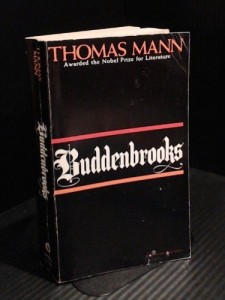
Buddenbrooks by Thomas Mann
 My parents are very smart, and very well educated. Â They have always spoken highly of Buddenbrooks by Thomas Mann. Now that I have finished it, I don’t know why.
My parents are very smart, and very well educated. Â They have always spoken highly of Buddenbrooks by Thomas Mann. Now that I have finished it, I don’t know why.
It is not a cheerful book.
It is not a pleasant book.
It is a very long book – longer than the approximately 600 pages belies.
I’m still scratching my head. Â As I’ve gotten older, my capacity to appreciate and understand difficult and challenging texts has improved … but perhaps not to the degree required to “get” this book.
The writing is good, if dated – it feels something like Dickens – but without any positive outcomes. There are some sections which resonated uncomfortably, but not in a particularly illuminating fashion.
The characters are almost universally unhappy and even tragic. Â Some are detestable, some are weak, and others merely groundless, seeking happiness in appearances.
The first major character is almost likable, at least initially, Antonie, or Tony as she is called throughout much of the book. Â She enters the story as a high-spirited, if spoiled daughter of a patrician family in 19th century Germany. She struggles with the expectations of her family position and falls in love with someone below her station. Her father intercedes and forces her to marry someone who can do the family firm credit. Â Tony, in a nearly untenable situation, marries her proscribed husband, who turns out to be a shit and a scoundrel. Â Although one feels a certain sympathy for him, since a loveless, shallow marriage doesn’t seem like a good exchange for the dowry he squanders. Tony’s father steps in and arranges a divorce.
Tony’s union with husband number one produces a daughter who is doomed to repeat pattern. Â Her husband gets thrown in prison for embezzling funds. Â When released as a ruined man, he abandons his wife and child. Â No happy endings there.
Tony manages to wrangle a second marriage, but botches it. Â Husband number two really just wanted to love and be loved, and wasn’t after financial gain or position. Â Tony’s shrewish behavior dooms this marriage as well. Â At this point in the book, the reader (at least this one) loses all sympathy for Tony, and can’t help but feel that husband number two is better off without her.
At about the time of Tony’s first failed marriage, her brother Thomas abandons his chance at true love, and takes over the family business, some sort of mercantile trading house. Â Maybe ten years later, he makes an advantageous, practical, and loveless marriage to the desperate daughter of a wealthy businessman. Â Their union produces a weak and insipid male child who would likely have been a homosexual had he not died at the end of the book. I could almost feel sorry for him. Â The only truly likable character in the book is his friend Kai, a sort of Huck Finn who doesn’t figure much in the story until the very end.
The story is a long and detailed account of the decline of the Buddenbrook family. Â Thomas tries to focus his life on living up to what he thinks is expected of him and completely misses anything of real importance in life. His character is one of superficiality and holding life together by force of will, rather than passion. Â There is a lesson in there somewhere, but this is no morality tale.
His brother Christian is a hypochondriacal fool, who becomes more and more self-centered and detestable as the story progresses. Â He ends up marrying a prostitute with children who may or may not be of his making. Â His quirks and inane behavior proves too much even for her and she has him committed.
After muddling through this, I’m still asking myself. Â “What was the point?” Â Perhaps this is merely an experiential novel. Â I don’t ever intend to experience it again.
 The posts are coming!
The posts are coming!

1 comment
Did you ask Marcia why she liked the book? Please ask her to post her comments. Best regards, George Archibald in Berryville, Virginia.
[Reply]
Leave a Comment